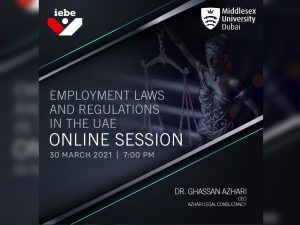This website uses cookies so that we can provide you with the best user experience possible. Cookie information is stored in your browser and performs functions such as recognising you when you return to our website and helping our team to understand which sections of the website you find most interesting and useful.
-

Protected: UAE Announced New Labour Law Regulations To Be Effective From February 2022
There is no excerpt because this is a protected post.
-

DIFC Enacts New Employment Law
The new DIFC Employment Law, Law No. 2 of 2019, which was enacted on 30th […]
-

Post Termination Restrictions of a Departing Employee
An important means for Employers to protect their business, confidential information and secrets from departing […]
-

Ministry of Labour Provides Official Template of Offer Letter
Background Following the three ministerial decrees of January 2016, all employees across the UAE will […]
-

UAE Labour Law 2016
New UAE Labor Regulations: Higher Labor Standards On September 27, 2015, the Ministry of Labour […]
-

Key Distinctions between DIFC Employment Law and UAE Labour Law
Probation, Notice Period & Termination: Under UAE Labour Law, the employee and employer can agree […]
-
Gratuity Calculation in the UAE
Gratuity Calculation in the UAE At the termination of employment contract an employee in the […]
-
UAE Labour Law Reform 2016
Labour Law of UAE – Reforms for 2016 Expatriates and business owners have warmly appreciated […]
Recent Posts
- Will Be Free Zone Companies subject to the Corporate Tax?

- Protected: UAE Announced New Labour Law Regulations To Be Effective From February 2022

- SCHOLZ KAUFT STEUERDATEN AUS DUBAI –

STRAFFREIHEIT DURCH STEUERLICHE SELBSTANZEIGE - TODAY, Tuesday 30. March 7.00 PM: ‘Employment Laws and Regulations in UAE’ with Dr. Ghassan Azhari @ GoToMeeting Online

- Part 32 Offer – Early Disposal of Claims at DIFC Courts




